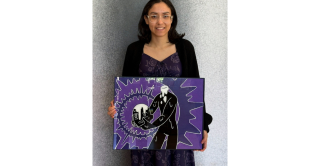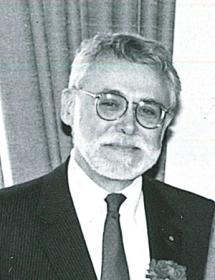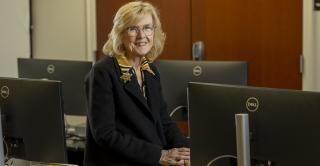
The Stanislaus A. Blejwas Endowed Chair in Polish and Polish American Studies was inaugurated in 1997 at Central, thanks to the generosity of Connecticut's Polish Americans and their friends and a matching grant of $600,000 from the State of Connecticut. The chair is named in honor of the late Dr. Stanislaus A. Blejwas, founder of Central's Polish Studies Program. A pioneering scholar in Polish Studies, Blejwas left an indelible mark on Polish Studies at Central and throughout the world. Presented below is an editorial memorializing Blejwas in the spring 2002 issue of the journal Polish American Studies.
Stanislaus A. Blejwas
1941-2001

There is a long-standing controversy in academe over whether biological heredity or social environment plays the key role in determining a person's future. In Stan Blejwas, there was no conflict, only a convergence of these forces into a person uniquely qualified by both heredity and environment to assume a leadership position in his chosen field.
Born in New York City to Polish immigrant parents on October 5, 1941, Stan's "world view" began to develop early in life as he rose to maturity in an environment rich in the cultural heritage of his parents' homeland. After receiving his baccalaureate degree summa cum laude from Providence College in 1963, he pursued graduate study at the University of Warsaw and enrolled in the doctoral program at Columbia University.
While earning his master's degree in history and a certificate from the Institute on East Central Europe in 1966 and his doctorate in Modern East European and Polish History in 1973, he became Assistant Director of Columbia University's Institute on East Central Europe. His seminal dissertation on "Warsaw Positivism 1864-1890: Organic Work as an Expression of National Survival in Nineteenth Century Poland" led to new interpretations that challenged some long-held theories in Polish historiography.
In 1974 he accepted the challenge of a faculty position at what was then Central Connecticut State College in New Britain, Connecticut. At Central Connecticut, Stan rose quickly to the ranks of associate professor in 1979 and professor in 1984. In 1989 he was named to the rare and prestigious position of Connecticut State University Professor of History. Throughout this entire time, he devoted tremendous energy to his position as Coordinator of the Polish Studies Program, while still maintaining active teaching and research schedules.
It was Stan's dream to create an endowment to solidify a permanent teaching, research, and public program at Central Connecticut that would serve as a beacon for scholarship on the Polish experience throughout the world. Years of hard work convincing people and collecting money finally paid off in 1997 with the creation of the first fully-funded Endowed Chair in Polish and Polish American Studies in the country, a position that has been named in his honor since his untimely passing.
He also developed the Polish Heritage Collection in the Elihu Burritt Library at Central Connecticut, and organized several hundred lectures, films, and other Polish cultural activities for the greater Connecticut community.
A professional life of success in teaching, research, and program development might be enough for most people, but not for Stan. A frequent visiting faculty member at various colleges and universities, including his alma mater Columbia, Stan pursued a vigorous research agenda which contributed significantly to our understanding of both Polish and Polish American history, while earning the respect of his colleagues as evidenced by the many awards acknowledging his efforts: a Fulbright-Hays Fellowship to Poland in 1967-68, a Kosciuszko Foundation Doctoral Dissertation Award in 1974, a Joseph Swastek Prize from the Polish American Historical Association awarded four separate times (in 1981, 1985, 1993, and 1998), a National Endowment for the Humanities Fellowship in 1982, an Honorary Fellow of the University of Minnesota's Immigration History Research Center in 1986, a Mieczyslaw Haiman Medal for distinguished contributions to the field of Polish American studies awarded by the Polish American Historical Association in 1990, a Distinguished Service Award from the Polish American Historical Association in 1999, and in 1995, then Polish President Aleksander Kwasniewski awarded Stan the Officer's Cross of the Order of Merit of the Republic of Poland for his contributions to the Polish-American community and for developing the Polish Studies Program at Central Connecticut State University. In October, 2001, Professor Wladyslaw Bartoszewski, Minister of Foreign Affairs of the Republic of Poland, presented Stan with the Foreign Minister's Diploma of Recognition for the promotion of Polish culture abroad.
Yet, there was more to Stan than even these awards would suggest. A life-long activist, he filled leadership roles as President of the Polish American Historical Association on two separate occasions; served as Co-chair of the National Polish American-Jewish American Committee; was twice appointed by President Clinton a member of the United States Holocaust Memorial Council; served on the Boards of Directors of the Polish Institute of Arts and Sciences in America, the Polish American Historical Association, the Jozef Pilsudski Institute, the National Polish American-Jewish American Council, the Kosciuszko Foundation, and the New Britain Public Library; served on the Editorial Boards of Polish American Studies and Polin: Studies in Polish Jewry; and was a member of the Editorial Advisory Board for the Ohio University Press Series on Polish and Polish American Studies; edited Occasional Papers in Polish and Polish American Studies published by Central Connecticut State University; served as president of the Polish Cultural Club of Greater Hartford, the Connecticut District of the Polish American Congress, and of the 44 Club; and was an Honorary Member of the Polonia-Paderewski Choir of New Britain, Connecticut, the Polish Singers Alliance of America, and the Eastern Massachusetts Division of the Polish American Congress.
Stan's efforts were truly monumental, as were his successes. But he was also a gentle, humane person. The president of Central Connecticut State University, Dr. Richard L. Judd, remarked on Stan's passing: "The sudden death of Professor Blejwas is a profound loss for the Central Connecticut State University community. The 'ojciec' of our Polish-American program, Professor Blejwas was respected globally as an eminent historian. A scholar's scholar, a historian's historian, he blazed many trails that have left an indelible and enduring mark in the academy."! His colleagues in the History Department added that "Stan was not only an outstanding scholar and teacher, but a valued friend and colleague. He invariably had a smile on his face, a good word for those around him, and was always ready for a brief sojourn to Staropolska for pierogies and beer."2
Nor did Stan recoil from controversy. As his scholarship and career matured, he became deeply interested in the long history of Poland's vast Jewish population and the more contemporary subject of Polish-Jewish relations in Europe and America. In this role, he rapidly rose to national leadership positions including a presidential appointment to the United States Holocaust Memorial Council. A press release from The National Polish American-Jewish American Council referred to Stan as "a devoted, passionate. and courageous leader promoting Polish-Jewish relations in America. . . . Professor Blejwas was an outstanding leader of the highest moral character. He was an upright voice for honest, open, and constructive dialogue between Poles and Jews in America and throughout the world, and inspirational in shaping the longstanding relationship between the two communities. He will be sorely missed."3
Jeffrey Weintraub 4, a colleague on the National Polish American-Jewish American Council, noted of Stan:
In addition to his warm, common-sense and gentlemanly style, I admired Stan most for his ability to cross boundaries that others might have avoided in the name of safety and convenience. That was, after all, the purpose of the Council: for people from both communities to step into the others' shoes and understand the complexity of the relationship between Poles and Jews. The battles were often draining and frustrating. Many others might have given up on it, but Stan was never worn down. He also crossed the boundary that sometimes divides the scholar and the activist. He apparently saw it as his scholarly duty not merely to chronicle history but to use it to advocate with passion for the needs of the Polish American community, the Polish people and for cooperation and reconciliation between Jews and Poles. And, as a scholar, his activism was always rooted in intellectual honesty, not merely in passion, though he showed that no good activist could afford to do without both. Stan was a remarkable and loyal friend to the Jewish American community who nevertheless remained steadfast to his role as a staunch protector of and advocate for Polonia. Indeed, Stan proved to many doubters that these two roles are not mutually exclusive. He understood all too well that the "conflict" we dealt with was not really between Poles and Jews. Rather, it was between people in both communities who tried to perpetuate conflict and those, like Stan, who wanted to move to a better day, never ignoring the darker hours. One of my regrets is that too few people in the Jewish community knew Stan, let alone that he spoke out vigorously and heroically against anti-Semitism in Polonia and advocated for the accurate and apt representation of Jewish memory in Poland. But we who do will always be grateful to him. More than anything, when I think of Stan I think of decency. That may sound trite, but only because such praise is too often applied to those who do not deserve it. But Stan was decent. I can think of no other word for his compassion, evenhandedness, generosity and desire to do, above all, what is right and good. Had decency been his only accomplishment, we could call his a life well lived. Lucky for all of us, he accomplished much more than that. What a man.
What a man indeed! Stan's gentle, kind, humble exterior masked within it a man of unparalleled activity and accomplishment. Some people are fortunate to find success in academia, being recognized for seminal contributions to research in their chosen fields. Some people are fortunate to find success in teaching, molding and enriching the lives and futures of their students. Some people are fortunate to find success in public ventures, building organizations, developing partnerships, and enriching their communities. Some people are fortunate to find success in group and interpersonal relations, helping to build bridges between people that lead to a better future for all. I know of no one who combined all of these attributes-except, of course, for Stan. The essays which follow in this symposium seek to illuminate, in some small way, the vast interests and contributions of a man whose career was tragically much too short. As a scholar, a teacher, a builder, a leader, and most of all as a friend, he will be supremely missed by us all.
James S. Pula, Editor
1 New Britain Herald, September 25, 2001.
2 Ibid.
3 Press release, The National Polish American-Jewish American Council, Washington, D.C., September 24, 2001.
4 Jeffrey Weintraub, e-mail posting, October 5, 2001.



